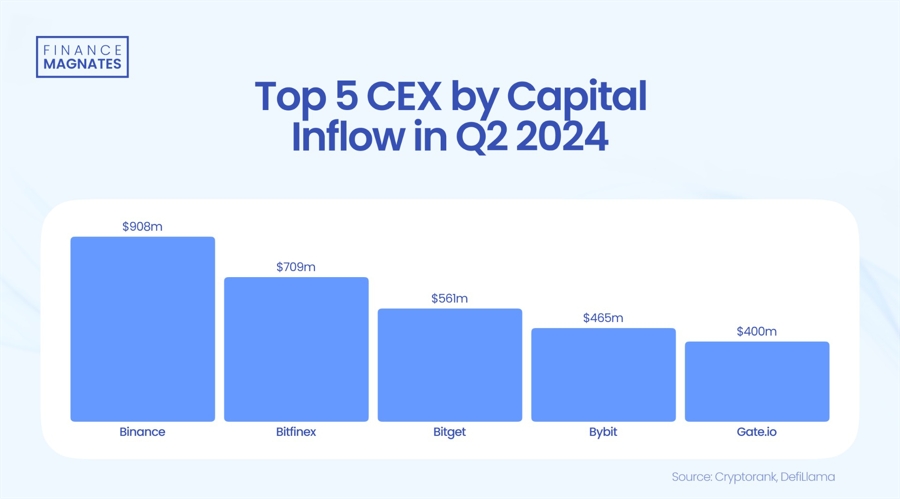News
Why are cryptocurrencies the defining political issue for true believers?

Consider it pure joy, my brothers, every time you face trials of various kinds, because you know that the test of your faith produces perseverance.”
– James 1:2, The Holy Bible.
The above Gospel, taken from the Bible, aptly summarizes the current state of affairs within the crypto ecosystem. “True believers” in the crypto community are witnessing troubled times where governments appear to be manipulating self-regulating platforms while cryptocurrency enthusiasts call for resistance.
The recent EigenLayer airdrop controversy The announcement sums up the situation perfectly. EigenLayer has been praised for its innovative blockchain technology; however, they were recently forced to engineer a highly restrictive airdrop (a crypto token distribution) due to fears of violating U.S. Securities and Exchange Commission (SEC) regulations.
The ongoing dispute between the SEC and various crypto platforms has sparked a debate over the ethics of governments tightening the noose around the crypto ecosystem with regulations that are stringent enough to violate the core beliefs of decentralized finance (DeFi).
The recent controversy over EigenLayer has reignited the debate over whether cryptocurrencies are simply an investment opportunity or a lifestyle where government interference is minimal or, at best, absent.
In this article, we will illuminate the philosophical aspect of the crypto ecosystem, the need for DeFi, and the apprehensions of governments.
Cryptocurrency as a philosophy and movement
The cryptocurrency, with its decentralized nature, has attracted millions of users. For “true believers”, cryptocurrencies are not just money or a means to make a fortune, but they see them as having potential for existing financial systems. For them, cryptocurrencies are a movement, a philosophy that challenges the status quo of government-backed financial institutions and offers people a decentralized financial system.
In 2009, when Satoshi Nakamoto published a white paper on Bitcoin and launched the genesis block into the blockchain, he had embedded a newspaper headline in the coin’s base transaction as a timestamp. The newspaper headline dated 3 January 2009 read: “Chancellor on brink of second bailout for banks”.
Many believe that Nakamoto left a cryptic attack on the traditional banking structure with the newspaper headline as a timestamp. Traditional banks, which were supposed to act as guarantors for two people carrying out transactions, collapsed several times and required state intervention for “rescue”.
Cryptocurrency as a peer-to-peer electronic money transfer system was developed as an antithesis to traditional centralized banking and financial systems. The fundamental principle of cryptocurrencies is that of decentralization: complete transparency and no single entity powerful enough to control everything.
What does it mean? This means that there is no single body responsible for keeping records and managing transactions. Transactions recorded on the blockchain are transparent so everyone can see them and secure because no one can transfer ownership.
This focus on decentralization stems from another fundamental principle: individual autonomy. Cryptocurrency enthusiasts believe that individuals should have control over their finances, free from regulations and limitations imposed by banks and governments. They view traditional finance as a mature system, subject to manipulation and limited access, particularly for those outside established economic systems.
Distrust of the mainstream is a fundamental principle of cryptocurrencies
Whether it’s governments, mainstream media, or traditional banks, the crypto ecosystem is built on a deep sense of mistrust towards each of them. There’s a reason cryptocurrency enthusiasts depend on X (formerly Twitter) and Reddit for “news and views” rather than legacy news channels and newspapers.
This distrust of central authorities is a key element of crypto ideology. True believers often view governments and banks as exercising undue control over the money supply, leading to inflation and economic instability. Cryptocurrencies, with their predetermined issuance schedule and limited supply, offer a potential alternative: a system less susceptible to manipulation. Likewise, they see social media as a level playing field where information can be dissected, analyzed and disseminated by anyone, not just journalists or “experts.”
Cryptocurrency enthusiasts believe that governments are meant to control people. The decentralization of cryptocurrencies will no longer allow the government to control people’s monetary matters. How would they tax you? The existence of cryptocurrency threatens this control and economic structure.
The regulatory dispute between governments and the crypto community
Cryptocurrency’s challenge to the status quo has triggered a global regulatory war. Governments around the world, particularly in the United States, are stepping up efforts to rein in this rapidly expanding industry. This regulatory pressure stems from concerns about everything from money laundering and consumer protection to tax evasion and financial stability.
However, for true believers, these regulations are seen as an attack on the very essence of cryptocurrencies. The EigenLayer aircraft launch situation exemplifies this clash perfectly. The SEC, they argue, is attempting to impose a one-size-fits-all regulatory framework on an industry built on flexibility and innovation.
The last few months have seen a flurry of such regulatory actions:
- The SEC has filed lawsuits against several cryptocurrency exchanges, alleging unregistered securities offerings and trading activities.
- The Biden administration recently warned about potential dangers from cryptocurrencies.
- The United States Congress has proposed several bills to develop a regulatory framework for the industry.
In this regulatory landscape, the cryptocurrency trading platform Matrix has emerged as a key player. Matrixator has navigated evolving regulations while providing a secure and innovative platform for trading a wide range of cryptocurrencies.
While aimed at mitigating potential risks, many in the cryptocurrency world see these actions as overreach that stifles the potential of this nascent technology. They support regulations that promote innovation by addressing legitimate concerns rather than stifling the entire industry.
The partisan divide between Republicans and Democrats
In the United States, support for cryptocurrencies has found a stronger foothold among Republicans, while Democrats express more caution and skepticism. This growing partisan disparity reflects deeper ideological differences between the two major parties and has significant implications for the future of cryptocurrency regulation in the United States.
The partisan schism over cryptocurrency is due to fundamentally divergent views on the role of government and regulation in the economy. Republicans generally support limited government intervention and favor deregulation to spur innovation and economic growth.
In this context, cryptocurrencies represent a symbol of financial freedom and decentralization, aligning closely with the republican ethos of individual freedom and the free market. Many Republican lawmakers and supporters see cryptocurrencies as a tool to challenge the dominance of traditional financial institutions and promote financial inclusion.
In contrast, Democrats prioritize consumer protection and financial stability, viewing regulation as essential to safeguard against fraud, market manipulation and systemic risks. They are more likely to carefully examine the potential negative externalities of cryptocurrency, such as its association with illicit activities and environmental concerns related to energy consumption.
The 2024 US election looms as a potential turning point in the path of cryptocurrency regulation. Depending on the outcome, the balance of power in Congress and the priorities of the executive branch could change, significantly impacting the regulatory landscape for cryptocurrency.
Conclusion
As cryptocurrency adoption increases rapidly, with cryptocurrency prices soaring, you can expect stricter laws and regulations from governments around the world. However, as the utility of blockchain technology spreads beyond DeFi and into other industries, we can almost hope that those in power will see the light and make the right decision. For believers these are difficult times, but there is always light at the end of the tunnel.
News
Block Investors Need More to Assess Crypto Unit’s Earnings Potential, Analysts Say — TradingView News

Block, a payments technology company led by Jack Dorsey square could become a formidable player in the cryptocurrency mining industry, but Wall Street will need details on profit margins to gauge the positive impact of the business on earnings, analysts said.
Block signed its first large-scale cryptocurrency mining hardware pact on Wednesday, agreeing to supply its chips to bitcoin miner Core Scientific CORZbut no financial details were disclosed.
JP Morgan estimates the deal could net Block between $225 million and $300 million, but said more information will be needed to assess the hardware business’s long-term earnings potential.
“We still have a lot to learn in terms of the margins of this business, so we are hesitant to underwrite this transaction until we know more about the cadence and economics,” J.P. Morgan said.
The deal marks a major step for the payments company, which started out as “Square” in 2009 before rebranding in 2021 in a nod to its focus on crypto and blockchain technologies.
Dorsey, who co-founded and ran Twitter (now known as “X”), has long been bullish on Bitcoin. Block began investing 10% of its monthly gross profit from Bitcoin products into Bitcoin in April.
In the first quarter, nearly 9% of the company’s cash, cash equivalents, and marketable securities consisted of bitcoin.
“This development (the deal with Core Scientific) is further evidence of Block’s role as an emerging leader in the crypto hardware ecosystem,” Macquarie analysts Paul Golding and Emma Liang wrote in a note.
Analysts say similar deals to follow could further validate Block’s reputation in the industry.
But J.P. Morgan said the stock’s performance will be determined by Block’s other segments, such as Square and Cash App.
Block shares have lost nearly 17% this year.
News
This Thursday’s US Consumer Price Index could be a game-changer for cryptocurrencies!

3:30 PM ▪ 4 minute read ▪ by Luc Jose A.
This Thursday, attention will be focused on the United States with the anticipated release of the Consumer Price Index (CPI). This economic indicator could trigger significant movements in the markets, especially for the U.S. dollar and cryptocurrencies. While investors remain vigilant, speculation is rife about the potential impact of these key figures.
The Consumer Price Index: The Cornerstone of the American Economy
The Consumer Price Index (CPI) is a key measure of inflation which reflects changes in the price of goods and services purchased by American households. This index is calculated monthly by the Bureau of Labor Statistics (BLS) and serves as a barometer for the cost of living. The consumer price index covers a wide range of products, including food, clothing, housing, health care, and entertainment. Economists and policy makers closely monitor this data to anticipate economic trends and adjust monetary policies accordingly.
The June CPI data is due to be released this Thursday at 2:30 p.m., and is highly anticipated by investors. The current consensus is for headline annual inflation to decline to 3.1%, from 3.3% the previous month, while core inflation is expected to remain stable at 3.4%.
THE BIGGEST EVENT THIS WEEK 🚨
The U.S. Consumer Price Index is expected to
PUBLICATION TODAY AT 8:30 AM ET.EXPECTATIONS ARE 3.1% WHILE
LAST MONTH THE CONSUMER PRICE INDEX (CPI) WAS 3.3%HERE ARE SOME SCENARIOS 👇
1) CPI above 3.1%
THIS WILL BE A DAMAGE TO THE MARKET
GIVEN THAT THE LAST TIME THE CPI DATA… photo.twitter.com/yudjPLPl8g— Ash Crypto (@Ashcryptoreal) July 11, 2024
Consumer Price Index Release: What Does It Mean for the Dollar and Bitcoin?
Inflation as measured by the consumer price index is a key determinant of the value of the US dollar. If the consumer price index declines more than expected, it could reinforce expectations of a rate cut by the Federal Reserve in September, thus weakening the dollar. A weaker dollar could benefit GBP/USD, which recently broke a major resistance level, and Bitcoin, which could see its price rise due to increased demand from institutional investors.
Current forecasts suggest that headline inflation will decline to 3.1%, with core inflation holding steady at 3.4%. However, a surprise increase in the consumer price index could upset these expectations. Fed Governor Lisa Cook has mentioned the possibility of a soft landing for the economy, with inflation falling without a significant increase in unemployment, which could lead the Fed to consider rate cuts. This outlook is particularly favorable for stock markets and cryptocurrencies, including Bitcoin, which could benefit from a more accommodative monetary policy.
According to experts at 10x Research, especially their CEO Markus Thielen, Bitcoin could see a significant increase if the CPI data confirms a decline in inflation. Thielen indicated that Bitcoin could reach almost $60,000, a prediction that has already been reflected with a rise to $59,350 before the data was released.
Therefore, Thursday’s CPI data could determine the future direction of financial and cryptocurrency markets. High inflation could strengthen the US Dollarwhile a drop in inflation could pave the way for rate cuts by the Fed, thus giving a boost to Bitcoin and other digital assets.
Enhance your Cointribune experience with our Read to Earn program! Earn points for every article you read and access exclusive rewards. Sign up now and start earning rewards.
Click here to join “Read to Earn” and turn your passion for cryptocurrencies into rewards!
Luke Jose A.
A graduate of Sciences Po Toulouse and holder of a blockchain consultant certification issued by Alyra, I joined the Cointribune adventure in 2019. Convinced of the potential of blockchain to transform many sectors of the economy, I am committed to raising awareness and informing the general public about this ever-evolving ecosystem. My goal is to enable everyone to better understand blockchain and seize the opportunities it offers. Every day, I strive to provide an objective analysis of the news, decipher market trends, convey the latest technological innovations and put into perspective the economic and social issues of this ongoing revolution.
DISCLAIMER
The views, thoughts and opinions expressed in this article are solely those of the author and should not be construed as investment advice. Do your own research before making any investment decisions.
News
Crowd Expects Bitcoin Bounce Suggests Further Losses, As RCO Finance Resists Crash

Bitcoin is seeing a rebound after its recent price crash to $53,000. Other altcoins are subsequently recovering, with many cryptocurrency investors increasingly making new entries. However, Santiment warned against this hopium, suggesting that Bitcoin could extend its price losses.
As the broader market anticipates Bitcoin’s next price action, RCO Finance (RCOF) demonstrates resilience, attracting thousands of people in influxes. Read on for more details!
RCO Finance challenges the market crisis
RCO Finance (RCOF) is approaching $1 million in funding raised, amid growing interest from institutional traders seeking stability from Bitcoin’s wild price swings. While much of the broader market has seen significant price losses, RCO Finance has remained resilient, experiencing a surge in its pre-sale orders.
As a result, the project seems oblivious to the current market conditions, leading top market experts to take a deep dive into its ecosystem. They identified why RCO Finance was able to withstand the bearish pressure and its potential to hold up even stronger during the impending broader market crash.
The main reason was related to the innovative use of RCO Finance AI Trading Tools as a Robo Advisor. This tool has been integrated into RCO Finance’s cryptocurrency trading platform, offering full automation and highly accurate market forecasts to help investors make informed decisions.
Read on to learn more about this tool and other exciting features of RCO Finance!
Bitcoin Bounces Amid Impending Crash
Bitcoin is bouncing back, rallying 8% after plunging to its lowest point since February on July 5. While this rebound has triggered a bullish wave in the broader market, many cryptocurrency analysts predict it could be short-lived as Bitcoin is poised for an imminent crash toward the $50,000 zone.
On a Post X (formerly Twitter)Santiment revealed that while the crowd is anticipating a Bitcoin rally, this potential crash could trigger FUD and panic, causing average traders to wither and give up on Bitcoin. The platform noted that Bitcoin rally has historically occurred after these weak hands sold their holdings.
In particular, these cryptocurrency analysts speculate that the previous and upcoming Bitcoin crash is largely the result of bearish market psychology, as opposed to large BTC sell-offs by the German government and Mt. Gox. In particular, Ki Young Ju, founder and CEO of CryptoQuant, noticed that “the sales were rather negligible, given the overall liquidity of Bitcoin.”
Enjoy seamless investing on RCO Finance
RCO Finance is making investing easier and easier, democratizing access to high-level tools and cryptocurrency earnings that were once reserved for professional and institutional investors. It has also prioritized accessibility, allowing investors of all levels to easily navigate its features through its intuitive interface.
Additionally, they can also maintain anonymity and privacy as the platform has no KYC requirements. To build trust, the platform has instead emphasized regular smart contract audits by respected security firm SolidProof.
Performance data shows massive adoption, indicating that it is doing its job effectively. Investors can also capitalize on RCO Finance’s fast transaction speeds and incredibly low transaction fees, with leverage options up to 1000x to further optimize their portfolios and maximize returns.
Leverage RCO Finance’s pre-sale earnings
An in-depth analysis of the RCO Finance ecosystem revealed that it has strong potential to rival and surpass major cryptocurrencies in the cryptocurrency industry. With a very limited total token supply and excellent tokenomics, RCO Finance is poised to reach its target of $1 billion in market cap upon its official launch.
RCO Finance has adopted a deflationary model, strategic burn mechanisms, and a vesting schedule. However, the project encourages long-term holding by focusing on sustained growth through incredibly high staking rewards.
RCOF tokens are currently available at an altcoin price of $0.01275 in progress Pre-sale Phase 1. This is likely the lowest price these coins will ever trade at, as they are expected to increase exponentially with each new presale phase.
With RCOF expected to be $0.4 at launch, investors jumping in now can expect a Return 30x on their investment!
For more information on RCO Finance (RCOF) presale:
Join the RCO Financial Community
Disclaimer: The statements, views and opinions expressed in this article are solely those of the content provider and do not necessarily represent those of Crypto Reporter. Crypto Reporter is not responsible for the reliability, quality and accuracy of any material in this article. This article is provided for educational purposes only. Crypto Reporter is not responsible or liable, directly or indirectly, for any damage or loss caused or alleged to be caused by or in connection with the use of or reliance on any content, goods or services mentioned in this article. Do your own research and invest at your own risk.
News
Bitget Ranks Third Among Cryptocurrency Exchanges by Capital Inflows in Q2

Although Bitget is not the largest cryptocurrency exchange in terms of total volumes, it closed a favorable quarter. From April to June, the platform ranked third in net capital inflows and showed the strongest growth in market share compared to its competitors.
In the second quarter, investors moved $700 million into Bitget, and activity on the platform increased by nearly 50%.
The exchange has seen a surge in user funds, with Bitcoin (BTC), Tether (USDT), and Ethereum (ETH) rising 73%, 80%, and 153%, respectively, in the first six months of the year. This growth coincided with adding 2.9 million new users to the platform.
This has positioned Bitget among the top exchanges with the highest positive net inflows in the last quarter. Only Binance, which remains the market leader, and Bitfinex have performed better in this category.
According to CCData’s latest H2 Outlook Report, the exchange also recorded the highest market share growth among centralized exchanges, increasing 38.4% from H2 2023 to H1 2024.
Bitget’s spot trading volume has also seen a visible increase, going from $28 billion in Q1 to $32 billion in Q2, marking an increase of over 10%. The platform’s monthly visitors have reached 10 million. Although its volumes are increasing, Bitget still does not rank among the top 10 cryptocurrency exchanges in terms of spot trading.
The changes taking place in the centralized cryptocurrency exchange market show that competition is becoming more and more intenseAn example of this is the recent surge in popularity of Bybit, which has become the second largest exchange in terms of spot trading volumes.
Sports Sponsorships and New Products
Gracy Chen, Source: LinkedIn
Gracy Chen, CEO of Bitget, commented on the quarterly performance, saying, “Q2 2024 was a pivotal period for Bitget. Our collaboration with Turkish athletes, along with significant growth in users and website traffic, is part of our global expansion.”
In an effort to expand its global presence, Bitget has partnered with three Turkish national athletes as part of its #MakeItCount campaign, starring Lionel Messi. The deal with the famous footballer It was signed in Februaryto build brand presence in Latin America.
The exchange also launched a $20 million TON Ecosystem Fund in partnership with Foresight Ventures to support early-stage projects on The Open Network.
The exchange introduced two new initial token listing products, PoolX and Pre-market, which collectively launched over 100 projects. Additionally, Bitget’s native token, BGB, was recognized as the best-performing centralized exchange token in June and was ranked among the top 10 cryptocurrencies by Forbes.
In its latest move, the cryptocurrency exchange aimed to become a regulated player in IndiaThe announcement comes as the world’s most populous democracy grapples with the complexities of integrating cryptocurrencies into its financial ecosystem.
Even recently,
Bitget Wallet Announced a joint investment with cryptocurrency investment firm Foresight X in Tomarket, a decentralized trading platform. This initiative targets emerging asset classes and aims to expand the portfolio’s services beyond traditional decentralized exchanges (DEXs).
Although Bitget is not the largest cryptocurrency exchange in terms of total volumes, it closed a favorable quarter. From April to June, the platform ranked third in net capital inflows and showed the strongest growth in market share compared to its competitors.
In the second quarter, investors moved $700 million into Bitget, and activity on the platform increased by nearly 50%.
The exchange has seen a surge in user funds, with Bitcoin (BTC), Tether (USDT), and Ethereum (ETH) rising 73%, 80%, and 153%, respectively, in the first six months of the year. This growth coincided with adding 2.9 million new users to the platform.
This has positioned Bitget among the top exchanges with the highest positive net inflows in the last quarter. Only Binance, which remains the market leader, and Bitfinex have performed better in this category.
According to CCData’s latest H2 Outlook Report, the exchange also recorded the highest market share growth among centralized exchanges, increasing 38.4% from H2 2023 to H1 2024.
Bitget’s spot trading volume has also seen a visible increase, going from $28 billion in Q1 to $32 billion in Q2, marking an increase of over 10%. The platform’s monthly visitors have reached 10 million. Although its volumes are increasing, Bitget still does not rank among the top 10 cryptocurrency exchanges in terms of spot trading.
The changes taking place in the centralized cryptocurrency exchange market show that competition is becoming increasingly intenseAn example of this is the recent surge in popularity of Bybit, which has become the second largest exchange in terms of spot trading volumes.
Sports Sponsorships and New Products
Gracy Chen, Source: LinkedIn
Gracy Chen, CEO of Bitget, commented on the quarterly performance, saying, “Q2 2024 was a pivotal period for Bitget. Our collaboration with Turkish athletes, along with significant growth in users and website traffic, is part of our global expansion.”
In an effort to expand its global presence, Bitget has partnered with three Turkish national athletes as part of its #MakeItCount campaign, starring Lionel Messi. The deal with the famous footballer It was signed in Februaryto build brand presence in Latin America.
The exchange also launched a $20 million TON Ecosystem Fund in partnership with Foresight Ventures to support early-stage projects on The Open Network.
The exchange introduced two new initial token listing products, PoolX and Pre-market, which collectively launched over 100 projects. Additionally, Bitget’s native token, BGB, was recognized as the best-performing centralized exchange token in June and was ranked among the top 10 cryptocurrencies by Forbes.
In its latest move, the cryptocurrency exchange aimed to become a regulated player in IndiaThe announcement comes as the world’s most populous democracy grapples with the complexities of integrating cryptocurrencies into its financial ecosystem.
Even recently,
Bitget Wallet Announced a joint investment with cryptocurrency investment firm Foresight X in Tomarket, a decentralized trading platform. This initiative targets emerging asset classes and aims to expand the portfolio’s services beyond traditional decentralized exchanges (DEXs).
-

 DeFi12 months ago
DeFi12 months agoDeFi Technologies Appoints Andrew Forson to Board of Directors
-

 Fintech12 months ago
Fintech12 months agoUS Agencies Request Information on Bank-Fintech Dealings
-

 News1 year ago
News1 year agoBlock Investors Need More to Assess Crypto Unit’s Earnings Potential, Analysts Say — TradingView News
-

 DeFi12 months ago
DeFi12 months agoSwitchboard Revolutionizes DeFi with New Oracle Aggregator
-

 DeFi12 months ago
DeFi12 months agoIs Zypto Wallet a Reliable Choice for DeFi Users?
-

 News1 year ago
News1 year agoBitcoin and Technology Correlation Collapses Due to Excess Supply
-

 Fintech12 months ago
Fintech12 months agoWhat changes in financial regulation have impacted the development of financial technology?
-

 Fintech12 months ago
Fintech12 months agoScottish financial technology firm Aveni secures £11m to expand AI offering
-

 Fintech12 months ago
Fintech12 months agoScottish financial technology firm Aveni raises £11m to develop custom AI model for financial services
-

 News1 year ago
News1 year agoValueZone launches new tools to maximize earnings during the ongoing crypto summer
-

 Videos6 months ago
Videos6 months ago“Artificial intelligence is bringing us to a future that we may not survive” – Sco to Whitney Webb’s Waorting!
-

 DeFi1 year ago
DeFi1 year agoTON Network Surpasses $200M TVL, Boosted by Open League and DeFi Growth ⋆ ZyCrypto






